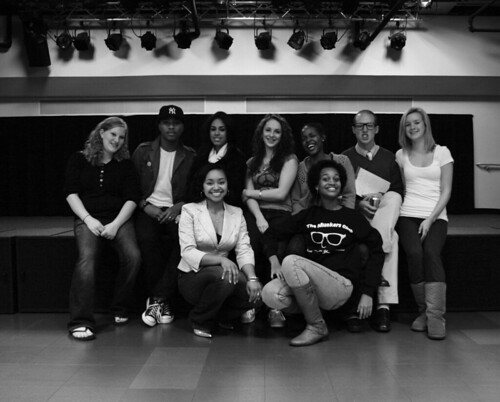It may be greeted with a finger-snapping audience, but even that couldn’t drown out the voice of Babel, Temple’s newest collective of performance poets.
“As poets, we can inspire you, educate you, make you laugh and make you cry,” said Ariana Santiago, a junior BTMM major and artistic director of Babel. “We have a voice that we want to be heard and that will be heard.”
The inspiration for this voice came when a group of friends realized there wasn’t a venue for poets to perform on Temple’s campus.
“Poetry is a dying form of literature,” said sophomore theater major Malcolm Kenyatta, who is the chairman of Babel. “We felt that people weren’t treating it as a real form of art and wanted to combat that idea on campus.”
So, after a three-hour phone conversation discussing everything from what to write in their group’s constitution to what to call themselves, Kenyatta, Santiago and Nia Davis, a sophomore psychology major and assistant artistic director of Babel, set out to make the collective official.

“We went through a few other names, but Babel felt right,” Santiago said. “We call each other ‘Babylonians’ now, and we feel like a big family.”
The group’s title stems from references to the Tower of Babel in the Book of Genesis in the Bible. Babel is not affiliated with any religion, and its members pride themselves on the diversity they exemplify.
“Our group has Christians, atheists, Jews, whites, blacks, Latinos, northerners, southerners, you name it,” Kenyatta said. “We are all very different, but we connect through the medium of poetry.”
But these religious, ethnic and geographic variances aren’t the only attributes that define differences among Babel poets.
“From the way we put on an entire performance to the way we say individual words, we’ve got a lot of differences,” said Megan Thomaston, a sophomore marketing major and member of Babel. “I think as far as poets go, those differences set Babel apart as the new generation.”
Whether they’re spitting spoken word poetry, a form where poems are performed as spoken lyrics, or slam poetry, a style that usually consists of collaborations and duels, each member of Babel brings something different to the group.
“We’ve got Christine [Peters] who writes with soothing, melodious imagery, Malcolm [Kenyatta] who is loud and in-your-face and Hannah [Adams] who sounds like an urban Johnny Cash,” said Mayte Espinal, a sophomore strategic and organizational communication major. “We could all write about the same theme, and it will come out with no two poems sounding alike.”
The group, which began seeking university recognition in September, already has 14 members and a growing fan base in Philadelphia’s performance poetry scene.
Babel has appeared as a collective in the Annual Minority Organization Showcase, hosted by Kappa Alpha Psi Fraternity, Temple’s Talent Revealed, presented by the Residence Hall Association and WHIP’s Open Mic. It also performed alongside University of Pennsylvania’s spoken word group, Excellano. Individuals from Babel have been featured in events such as GoodFellaz Talent Show and PhilaLive.
The group attributes its early popularity to the fact that it talks about common issues in a way that is easy to relate to.
“We talk about everything from politics and religion to how we felt when our boyfriend or girlfriend broke up with us,” Kenyatta said. “We try to create words for complex emotions. We really believe that when you’re able to do that, you can affect a life.”
Babel is advised by the theater department’s Dr. Kimmika Williams-Witherspoon, an award-winning poet, journalist, producer and playwright.
Hannah Adams, a freshman philosophy major and one of the most recent additions to Babel, agrees that it is not difficult to turn poetry into a familiar, relatable thing.
“People hear poetry and put it on a pedestal like it’s some serious, complicated thing,” Adams said. “We’re not like that in Babel. We want poets and non-poets alike to understand what we have to say so that everyone can relate.”
Maria Zankey can be reached at maria.zankey@temple.edu.


Be the first to comment